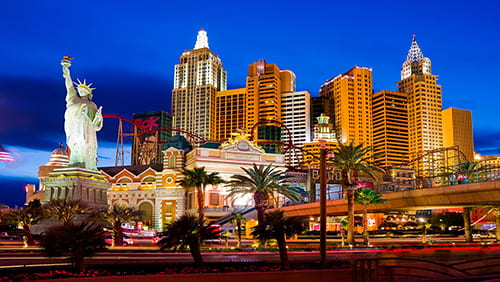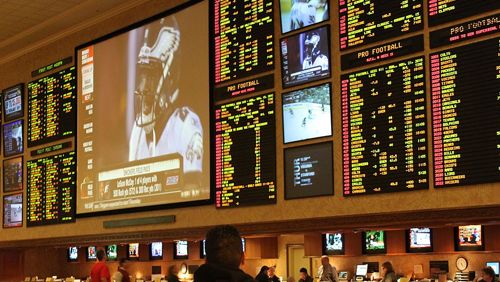Vekoma, the top-ranked horse in the NTRA’s Top Thoroughbred Poll, remains targeted for the Forego Stakes Presented by America’s Best Racing (G1) at Saratoga Aug. 29 after having a workout delayed by a foot bruise, trainer George Weaver said.
Monthly Archives: August 2020
Champions Day Prize Money Slashed Due to COVID-19
Prize money for this year’s QIPCO British Champions Day at Ascot has been slashed by £1.7 million as the figures for the marquee October raceday were announced Aug. 6.
Texas lottery thief caught after attempting to cash stolen tickets
A thief who stole two whole bins of Texas Lottery scratch-off tickets from a gas station has been caught by police after he attempted to cash in a prize.Texas, Legal, Scratch Games, Theft, Law Enforcement, Crime
Twirling Candy's Sweet Ride
Collusion Illusion became Twirling Candy’s fourth grade 1 winner in the Aug. 1 Bing Crosby Stakes (G1) at Del Mar. A consistent leader, the Lane’s End stallion has been on a hot streak.
Penn National Gaming Posts $214.4M Second Quarter Loss
Following second-quarter losses announced by Churchill Downs Inc. last week, Penn National Gaming Inc. reported a net loss of $214.4 million in the second quarter of 2020, compared to $51.4 million net income over the same period in 2019.

Poker in Print: The Godfather of Poker (2012)
There are many poker biographies available, and to some students of the game, those who have succeeded in the most recent era are most useful for those aspiring to greatness. However, in this week’s Poker in Print, we focus on an autobiography written by perhaps the most iconic poker player who has ever sat down to play the game we all love.
The Godfather of Poker is the story of Doyle Brunson, also known as ‘Texas Dolly’, who famously won two World Series of Poker Main Events in back-to-back years with the final hand of 10-2.
Brunson, who retired from tournament poker in 2018 after 50 years at the felt, covers mostly his early years in this fascinating book which harks back to a long-gone era of cowboy hats, pistols at dusk and playing poker for a living when even taking a seat in some games was to endanger your life.
Brunson’s autobiography (the book is co-written with Mike Cochran) covers everything you can imagine and plenty more. As Nolan Dalla calls him in the book, “Brunson is the Babe Ruth of poker”, and it’s easy to see the similarities. Brunson may have become the Godfather of poker as it is today, having been born 87 years ago in 1933, a full six years before the second World War, but he was a young man once and this book revisits that era.

UFC Fight Night: Lewis vs. Oleinik Odds
Odds courtesy of OddsShark.com
It’s a second straight Saturday night of UFC action this week at the organization’s Apex facility in Las Vegas with a Fight Night card headlined by a heavyweight bout between American Derrick Lewis and Russian Aleksei Oleinik (some sites may refer to him as Alexey Oleynik). The main card starts at 9 p.m. ET and is available in the United States on ESPN+.
The current heavyweight champion is Stipe Miocic, and he’ll fight No. 1 Daniel Cormier next Saturday at UFC 253 in Las Vegas. It’s possible both retire after that fight so maybe Lewis could get a title shot sometime in 2021 if he wins Saturday.
The 35-year-old Lewis (23-8) is ranked fourth in the division, is a former Legacy FC heavyweight champ and has never fought Miocic. He did take on Cormier at UFC 230 and lost by second-round submission. Lewis lost his next time out to former champion Junior dos Santos by second-round TKO but has since beaten Blagoy Ivanov by split decision and Ilir Latifi by unanimous decision.

Defending champion Rafael Nadal withdraws from US Open
Reigning U.S. Open men’s champion Rafael Nadal has confirmed his withdrawal from the Flushing Meadows event. Nadal cited the timing of the event being so close to the French Open and player safety as the motives for his withdrawal.
Nadal has joined World Number One Ash Barty and Nick Kyrgios as confirmed withdrawals from the U.S. Open in recent weeks. Nadal called on tennis authorities to give players more control over the timing of events in the revised calendar. “We know that the reduced tennis calendar is barbaric this year after 4 months stopped with no play,” Nadal said on Twitter.
After many thoughts I have decided not to play this year’s US Open. The situation is very complicated worldwide, the COVID-19 cases are increasing, it looks like we still don’t have control of it.
— Rafa Nadal (@RafaelNadal) August 4, 2020https://platform.twitter.com/widgets.js

Gambling Industry Announcement and Partnership Roundup – August 6, 2020
In the fast moving world of gambling, sometimes you might miss news that could be important to you. To make sure you’re all caught up on gaming industry news, be it online or brick and mortar, we’re rounding up the some of the announcements and partnerships from the last week that you might have missed.
Don’t miss out on all of the latest announcements. Our Press Release section is updated constantly.
OneTouch inks partnership with Slotegrator
Mobile-first games developer OneTouch has partnered with the fast-growing content aggregator, Slotegrator, in a move that further bolsters its international footprint.

EveryMatrix recruits Erik Nyman to establish US presence
Technology provider EveryMatrix recruits iGaming executive Erik Nyman to join its Leadership Team and lead the opening of the company’s first US office.
Erik Nyman will lead EveryMatrix’s expansion in the US market by building the organization as President Americas. With over 10 years of experience in the online gaming business, Erik is specialized in new market entries and strategic deals. His leadership and business acumen played a pivotal role in establishing NetEnt in the US.
CasinoEngine, the company’s iGaming and Integration Platform, will be the leading product for the expansion, following its massive success in several European markets.
Ebbe Groes, Group CEO of EveryMatrix, comments: “Expanding into the US is the next step for the organization. We have a strong European presence, very experienced teams, premium products on both casino and sports, so tackling more regulated markets is a logical strategic move for us.

European Gaming Congress merges with CEEGC to discuss 2020 in pioneering free event
Hipther Festival sets its sights on bringing together gaming, AI, fintech and blockchain
Thursday, 05th August 2020: European Gaming, Central and Eastern Europe’s leading betting and gaming media platform, is set to merge its two key conferences this year into a week-long digital extravaganza.
With the virtual edition of the European Gaming Congress 2020 taking place between Tuesday 6th and Wednesday 7th October, delegates will also be granted free access to the wider Hipther Festival taking place throughout the week from Monday to Friday, encompassing the fintech, blockchain and AI crossover.
Billed as Europe’s largest gaming compliance meeting of the year, the virtual European Gaming Congress will bring together EU / EEA and Balkan heavyweights to discuss the continent’s latest developments.

FanDuel line error leads to regulator investigation
A line error is always going to be a cause for controversy for a sportsbook, but when they’re small and manageable it blows over pretty quickly. But heavy action on some soccer lines, with apparent approval from at least one supervisor, have led to a storm of controversy for Fanduel, who may now have to answer to regulators in New Jersey and Indiana.
Between July 12 and 15, gamblers in the two states bet heavy on games in MLS, the Premier League, La Liga and Serie A. Many thousands of dollars were bet, and FanDuel faced a potential payout of over $200,000. All the bets won of course, and then bettors were frustrated when a hold was placed on their payout.
Atleast in one case, it appears an error within the sportsbook’s operation allowed the gamblers to tease lines without affecting the odds. ESPN reports Daniel Leavy, who placed his bet in person with a teller at the Meadowlands, was permitted to wager $5,360 on FC Cincinnati +5 at -134. With soccer games usually having low scores, that’s an impossible line, and odds for it would normally come in at -1,340. Leavy, who’s wager was given approval by a supervisor on site, then doubled down on the wager, putting an additional $4,640 on the team for $10,000 total.
After Cincinnati won 1-0, Leavy arrived to collect his winnings, $17,462.69 total, but was informed a hold had been placed on the bet. “They’ve held it for nearly three weeks with no communication,” Leavey told ESPN.

NFL’s former Redskins have new helmets, still no name
The NFL team formerly known as the Washington Redskins finally caved against overwhelming pressure to change its name this past July, but has yet to offer an alternative. The brass at the franchise is busy with damage control over reports of widespread sexual harassment that has already led to at least five employees, either by force or by choice, announcing their departures. However, it plans on surviving the drama and is making preparations to start the upcoming NFL season along with the rest of the teams. While the team, now simply called the Washington Football Team, may not have a viable name, at least they’ll have pretty helmets.
The team posted a video on Twitter yesterday, unveiling the new helmets as it announced “exciting news.” The individual affixing numbers to the helmet, which will use the same color scheme the team has used for decades, can’t be seen, but he’s applying “20,” which is the number worn by safety Landon Collins. Notably absent from the helmet is any type of logo, moniker, drawing or even shadow, giving the helmet the appearance of being something one would see out of a low-budget rural community college. Previously, the helmets carried the Redskins logo, with the player’s number nowhere on the protective headgear.
Reactions to the changes have been mixed. Some haven’t been afraid to show their opinion of fashionable by supporting the changes, while others recognize that they leave something to be desired. One Twitter user, Dominic Lucente, pointed out, “Looks like a college football helmet but that seems appropriate. You have been playing like a college football team going on many years now.” In the past decade, the former Redskins only had winning seasons twice. Another tweeter aptly summed things up, responding to the team’s announcement by saying, “I don’t think you know what ‘exciting’ means.”
The regular NFL season is expected to get underway on September 10, providing the coronavirus doesn’t force the league to make any last-minute changes. It has already had to scrap the All-Star Game and the preseason games, but everything else seems to, at least for the time being, remain on schedule. If it does, this could be a great fall for sports fans everywhere.

New York state inspectors concerned if tribal casino’s are pandemic safe
New York’s Native American casinos are bringing in customers. Not beholden to the state’s mandate to keep casinos closed at this stage of the pandemic, the casinos continue to operate while implementing their own strict safety procedures. But state employees are unclear why there is any leeway for this activity when commercial casinos remain closed.
The Auburn Citizen reports the New York Gaming Commission has sent gaming inspectors back to Native casinos to ensure all regulatory policies are being followed. But the paper further adds that they have sources noting inspects were back at casinos owned by the Oneida and Seneca nations as early as June.
The casinos implemented their own health and safety guidelines in reopening, as any casino hoping to win back customers during this pandemic would have to, but inspectors are concerned about a lack of compliance from customers.
The Civil Service Employees Association, the union of the inspectors, had this to say:

German casino group wants a massive crackdown on unlicensed operators
The iGaming scene in Germany is changing and is expected to see a huge step taken next year. Strict limits on how much people can wager online are expected to be implemented, and other restrictions are being considered that have the iGaming market struggling to determine if operating in the country is worthwhile. There are also issues with what constitutes an approved license, given that the state of Schleswig-Holstein has been extremely receptive to online gaming operators, and an overall push to punish financial institutions that work with iGaming companies has been a thorn in the side of those companies that had received licenses there. While those punishments have served their purpose, some lawmakers believe Germany could do a lot more, and a casino advocacy group is now trying to force legislators to take action.
The Deutsche Spielbankenverband (DSbV), or the German Casino Association, wants lawmakers to make payment blocking orders their number-one priority in order to cut off completely unlicensed iGaming operators that target the country. In support of its campaign, it pointed out the massive fraud associated with Wirecard, Germany’s payment processor that had served, among others, the gaming industry and which just went bankrupt after billions of dollars went missing. In a statement, DSbV CEO Otto Wulferding accuses banks of facilitating illegal transactions and adds, “On Wirecard, the topic of monetary transactions for companies such as online casinos should be high on the agenda.”
Wulferding feels that regulators haven’t been proactive enough in controlling the unlicensed iGaming market, which he asserts has had “far-reaching consequences” on the retail segment. As a result of the lack of control, the unlicensed market has gone wild and is out of the grasp of the regulators. He cites as further evidence the presence of online and TV ads that promote online gaming, even though there is no national regulatory framework which would allow the activity.
However, at the heart of the issue – just like what has been seen elsewhere – is the retail casino industry’s belief that iGaming eats into their profits. The executive alludes to this when he points out that online casino revenue increased 6.2% from 2018 to 2019, and he almost certainly believes that gamblers would have spent that money at retail casinos if they hadn’t spent it online. If that’s the case, he’s dead wrong.

Crypto Twitter hackers busted after currency sent to verified accounts
By now, almost everyone has heard of the massive Twitter hack that was perpetrated a couple of weeks ago, and the ease with which the scammers were able to access the giant social media platform. As the criminals sought to collect as much cryptocurrency as they could, they were stopped relatively quickly, but not before being able to pick up around $144,000. In the end, the criminals were found to be three teenagers, and their own actions led to their undoing. With more cryptocurrency companies following established financial regulations, tracing the crypto transactions to their roots was extremely easy.
The three perpetrators – 17-year-old Graham Ivan Clark and 22-year-old Nima Fazeli of Florida, and 19-year-old Mason Sheppard from the U.K. – led a spear-phishing campaign that allowed them to convince a Twitter employee into giving up his access to the network. That allowed them to create posts through legitimate accounts, such as those owned by Elon Musk, former U.S. President Obama and others. What they didn’t count on is the advanced nature of current blockchain analysis tools, which are now sophisticated enough to almost immediately be able to trace movements on any blockchain.
Although the scammers tried to move some of their ill-gotten funds through online gambling sites, nothing they did escaped the tracking mechanisms. These also were able to follow the trails to at least one account created on the Coinbase exchange, which had been registered using the criminal’s legitimate personal data. After that, putting all the pieces of the puzzle together was child’s play.
The belief that the digital currency ecosystem is completely private and anonymous is a fallacy that continues to be perpetrated by those who haven’t bothered to actually educate themselves on how Bitcoin works. Across the globe, countries have taken initiatives to ensure better transparency on blockchains, as well as to adhere to established financial regulations that govern the fiat segment. Granted, fiat had a huge head start in being better managed, but the crypto space has rapidly caught up over the past couple of years.

Everi Holdings credits fast casino reopenings for saving Q2 earnings
Everi Holdings had a pretty bad second quarter, but it could have been worse. While the company saw a massive net loss, it credited a faster than expected reopening of casinos and cost cutting as their saviors during the worst of the Covid-19 pandemic.
Overall, the casino games supplier saw $38.7 million in revenue, a large drop from the $129.7 million it saw the year previous. That resulted in a net loss of $68.5 million, representing a loss of $0.80 per diluted share. For the same period in 2019, Everi had a net income of $5.5 million, or 7 cents per diluted share. Adjusted EBITDA (Earnings before interest, taxes, depreciation, and amortization) was $3.3 million, falling from $64.1 million in 2019.
Everi’s CEO, Michael Rumbolz, says it could have been far worse, but earnings started coming on due to “the swift actions we took in March when the pandemic struck to reduce our operating costs and preserve liquidity during the time casinos were shut down; as well as our focus on enhancing operational efficiencies and pursuing higher-value opportunities.”
Rumbolz noted that Everi’s FinTech solutions showed strong performance, and Truist Securities gaming analyst Barry Jonas believes it will be on the back of that vertical that Everi shows strong recovery through the rest of the year. “We think these factor not only ongoing strength seen across our regional operator coverage but also company-specific growth drivers as Everi had strong momentum in their premium leased product and FinTech offerings into the pandemic,” he said.

Casino expansion plans in Singapore likely to be put on hold
The effects of the coronavirus pandemic are going to be felt for a very long time, especially since the virus still hasn’t been brought under control almost a year after it was first seen. Across the globe, the casino industry has had its legs cut out from under it, and there is no shortage of gambling properties that have already been forced to shut down. While the overall prognosis indicates a fairly strong recovery within a few years, some areas are taking it on the chin worse than others. Singapore could be one of these, and, according to the country’s tourism head, there might be a need for the major casino resorts to rethink their short-term strategies.
Singapore Tourism Board (STB) CEO Keith Tan got together with Bloomberg TV for an interview to share his take on how the country is rebounding from COVID-19. During that conversation, he admitted that it is “inevitable” that the two casino resorts in the country, operated by Genting Singapore Lt and Marina Bay Sands Pte Ltd., would face delays in their ongoing expansion plans. However, he added that neither has yet acknowledged any variation and stated, “I see that as a good sign of their faith and confidence in the longer-term tourism prospects of Singapore.”
That assertion isn’t totally consistent with remarks made recently by Las Vegas Sands (LVS) CEO Sheldon Adelson. LVS is behind the Marina Bay Sands in Singapore, and said during a financial call in July that, overall, the company had lost almost $1 billion in the second quarter of the year. As a result, he anticipates Marina Bay Sands to face some delays as a direct result of the impact of COVID-19. However, he was quick to add that the long-term forecast was positive. His definition of long-term isn’t clear.
Instead of delays coming from the casino operators, which are dealing with huge revenue deficits, any possible alterations to casino expansion plans could stem from a disruption in the construction sector and a drop in tourism, according to Tan. Over the first five months of this year, international arrivals have slipped 65.7% from the numbers seen in the same period last year, reaching only 2.66 million. In April and May, according to the STB, just 1,000 international arrivals were seen.

PointsBet hits a double-play with NJ, Indiana deals
Australia’s PointsBet iGaming and sports gambling operator has had a busy week this week. It secured two major deals, one each in Indiana and New Jersey, that will allow it to further cement its foothold in the US. With almost all major sports now back in action, and the NFL coming up in just over a month, PointsBet is quickly grabbing a piece of the sports gambling action in the country while, at the same time, it is expanding its iGaming operations. With possibly more legalized iGaming and sports gambling on the horizon, it’s in good shape to be one of the top players in the US gaming industry.
Earlier this year, PointsBet announced that it had secured a sports gambling license to operate in Indiana, marking a huge milestone for the company. Building on that, it is now the official gaming partner of the NBA’s Indiana Pacers. The basketball team has given PointsBet a multi-year contract that will see the gaming operator gain massive exposure for its sports gambling app. In addition, the company’s logo will appear on the Pacers’ home court at Bankers Life Fieldhouse, and PointsBet will also earn bragging rights for becoming the first sportsbook operator to receive this level of exposure on the court of any NBA team.
Asserts PointsBet CEO Johnny Aitken, “Indiana represents a massive opportunity for PointsBet, and we will take a heavily localized approach to ensure we are delivering the best overall customer experience Indiana sports fans and bettors are seeking.”
That deal was announced on Tuesday and, just a day later, PointsBet was busy sealing another partnership in New Jersey. It is now in bed with Twin River Management Group (TRMG) for the next ten years, thanks to an arrangement that will see it become a skin for the casino operator’s iGaming operations. The deal hangs on approval by state regulators and the successful purchase of Bally’s Atlantic City through an agreement as part of the Eldorado Resorts/Caesars Entertainment merger.

UNLV IGI report offers a blueprint for legal US sports gambling
Sports gambling has been a contentious subject in the US, as well as in other countries, for a very long time. There are constant objections to making the activity legal, with most opponents arguing that allowing sportsbooks to operate in the open would lead to rampant integrity and match-fixing issues. The assertion has no solid data to back it up; if anything, a large unlicensed industry puts integrity at greater risk due to lesser oversight. On the heels of the coronavirus pandemic, legalized sports gambling is receiving a lot of attention for its possibilities in helping boost economies, but there are a lot of questions that have to be answered. Fortunately, the University of Nevada Las Vegas (UNLV) and its International Gaming Institute (IGI) have come to the rescue. The organization has published an in-depth report on sports gambling and how it can be legalized without undermining the sportsmanship spirit of athletic competitions. Lawmakers across the country should especially pay attention to the report as they wrangle with the creation of blueprints for legalized sports gambling.
IGI’s “The Big Questions: Sports Wagering in America” is a 33-page report (pdf) that, among other things, answers many of the questions regarding sports gambling and how it can be implemented legally while ensuring there’s no increase in corruption. It is accompanied by an infographic (pdf) that makes it easier for some to understand what is possible. Among the topics explored are ensuring integrity with legalized sports gambling, the impact the activity could have on youth, perceptions of gambling on the part of US citizens and more.
Whether certain lawmakers and casino operators want to admit it or not, sports gambling is already alive and well in the US. There’s a large grey area from which sportsbooks have been reaching US gambling fans, and the offshore market is said to be worth as much as $150 billion. That means that, not only is the US not able to capitalize on that tax revenue, but it is also unable to implement any significant oversight to protect gamblers. In addition, sports gambling has been legal in other countries for decades. While there have been integrity issues in those jurisdictions, they’re not “rampant” as some anti-gamblers would like people to believe.
The IGI report looks at that, as well as much more. It was sponsored by the GVC Foundation US, which was founded by gaming operator GVC Holdings, and authored, in part, by Alan Feldman, Distinguished Fellow in Responsible Gaming at IGI and chair of the International Center for Responsible Gaming. The GVC Foundation’s Martin Lycka, who also serves as the director of regulatory affairs for GVC Holdings, explains of the report’s purpose, “Our goal in drafting questions for the study was to highlight all major aspects of sports betting–the good, the bad and the ugly. For sports betting to be the fun, safe, and well-structured enterprise that it’s meant to be, our industry needs to commit to honestly presenting its unique components to all regulators and legislators alike.”